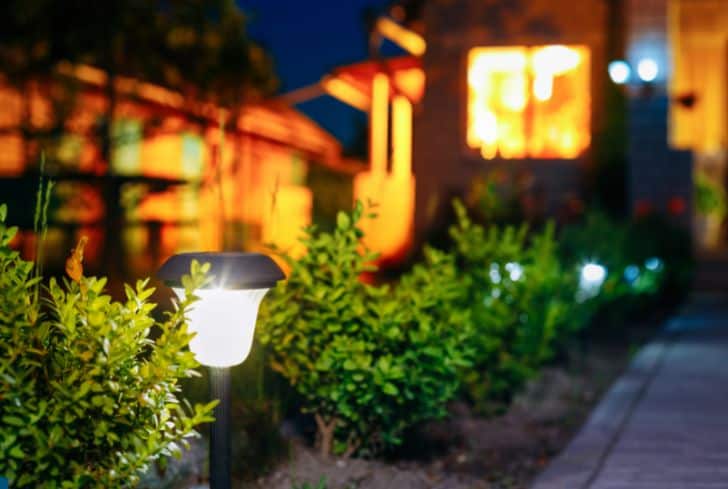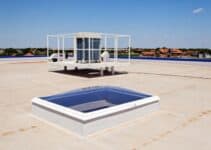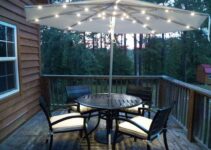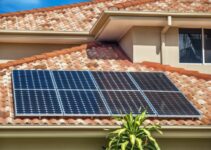It’s been raining a lot more recently in the United States, and it would be shocking if this doesn’t instill some fear in people looking to invest in solar lights. For one, increased rainfall automatically indicates less sunlight or less intensity. And solar panels need adequate exposure for maximum performance.
Solar lights have been designed to stay outdoors for the duration of their lifespan, come rain or shine. Manufacturers regularly test their products against diverse weather conditions, and panels for some parts of the United States are stronger because of weather-sensitive demands.
Are you concerned about installing solar lights and leaving them in the rain? You cannot exactly fold and unfold them every time they are needed, so what is your best bet? How can you install solar lights and prevent weather elements like rain from defeating your financial investment? Keep reading to find out!
Can Solar Lights be Left Out in the Rain?
Most certainly, yes. You can leave solar lights out in the rain, and your investment will still be safe. Solar lights have been created especially to be used outside, so it is only normal for them to experience every changing weather until their lifespan becomes expended.
Solar lights are available in different types and can be used to beautify and illuminate an area. Property owners have discovered that they are cheaper in the long run for lighting up their property, but the question remains whether they will survive in the rain.
They will, and since they have no wires which increase any risk of electrocution, leaving your solar lights out in the rain won’t pose any harm or danger to you and your family.
There are many types of solar lights. You can choose one that functions with motion sensors; they go on and off when at the slightest movement. Depending on the application, you can select units that focus more on aesthetics, functionality or even both.
However, they can all be left in the rain and will not spoil as long as you adopt proper maintenance routines. They are weatherproof with the best brands, protecting the batteries and other sensitive areas from harsh elements.
You can leave solar lights in the rain but take them in if you suspect the weather will get worse. Although the PV system is durable and reinforced against harsh elements, it is better to protect your investment as much as possible. If that includes bringing it indoors or erecting a protective cover over it during the rainy days, so be it.
But a quality product will hold up against a reasonable degree of rainfall without folding in.
Can Solar Lights be Left Outside in the Winter?
It depends, but mostly, you can leave solar lights outside in the winter. Moreover, you should initially be conscious of leaving your solar lights outside when it is snowing because some brands don’t seal their PV system properly. For this reason, it is easy for water to penetrate the structure, especially if you allow a buildup.
Furthermore, the decision to leave your solar panels outside in the winter depends on the area you live. Some regions in the United States experience more snow than others, so if you live in a place like that, you may consider bringing your solar lights indoors.
The performance of solar panels may not be as efficient during the winter days, but they will still function. Overall, it depends on the amount of snowfall and sunshine that blesses your region.
Typically, colder climes increase the output of solar panels, but that is mostly if there is adequate sunshine. And note this – the heat that accompanies solar energy is not necessary to power your solar panels. This means that even on days when it seems extra cold, your solar panels will still charge as long as the sun is shining.
Therefore, solar lights are not useless in the winter, and you can leave them outside. They will continue to serve the purpose they were manufactured for.
However, if the snowfall gets out of hand or you suspect it will, we recommend moving your PVC system indoors. If there is a significant amount of snow, it is likely to cover the surface of the solar cells anyway and will automatically receive less energy.
When moving your solar lights indoors for the winter, turn off the battery so that it doesn’t deteriorate before you need it again.
Do Solar Lights Work on a Rainy Day?
Yes, solar lights work on a rainy day since the sun’s rays penetrate cloudy skies. However, since the sunlight is limited, there will be less light for solar panels to absorb. As such, the performance will certainly dwindle because there won’t be enough photons to generate the sparks needed to create electricity.
We know that rainy days seem cold and sunless because of the cloudy sky, but these factors don’t affect solar panels much.
But of course, it also depends on the amount of rainfall that you are experiencing. Heavy rainfall with dark skies indicates the absence of the sun, so the panels won’t charge as effectively.
Solar lights work on a rainy day, but it depends on the degree of the elements. If the sun isn’t peeking out at all, you will be unable to charge the batteries of your solar lights. And even if they work, they will not stay on for long.
In the sense of it, weather affects solar lights. But it also helps keep your panels free from dirt and debris by washing them.
Does Rain Ruin Solar Lights?
It depends, but it technically shouldn’t, given that solar panels are subject to tests to determine if they will hold their own against weather elements. Without meeting basic requirements, the product may be rejected for sale. But if you have bought an inferior PVC system, it may be unable to hold its own against significant rainfall. But that’s not all that ruins solar lights in the monsoon season.
Usually, a good solar power brand will work efficiently even when it is raining. We trust that you would, however, bring them indoors when the rainy season progresses in a manner that appears tumultuous.
The rain itself will not ruin solar lights. If anything, it cleans the surface and washes off age-long dirt and debris. But if your solar panels are not fixed in a manner that water flows off easily, the moisture accumulates and causes damage later.
Furthermore, this may be why your solar lights are not lasting as long as they should, despite the rainfall. Water can act as an additional layer over the surface covering the solar cells, and that’s not good for performance and efficiency.
We are not saying it will immediately damage your solar panels, but you don’t want the water remaining stagnant for too long.
Solar panels have been designed to withstand harsh weather conditions. After all, they are intended for year-round use.
Of course, your PVC system will work better in summer than in winter, but it should work in both seasons. It is just a matter of maintenance – create a maintenance routine for your solar panels, and you will get the best use out of them.
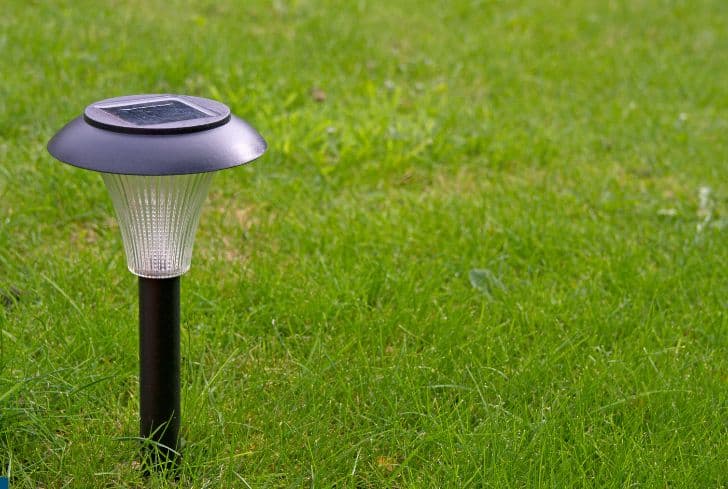
Do Solar Lights Stop Working in the Rain?
No, solar lights do not stop working in the rain. However, their performance may not be as impressive as usual during the monsoon season. And depending on how heavily the rain falls, you may satisfy your concern about the damage it can do to your solar panels by moving them indoors.
If you live in a place like Hawaii, with the highest rainfall in the country, you would need to buy solar panels designed especially for its weather conditions. The same applies to places with more extreme weather elements in the United States.
When approaching the height of the season, it is okay to move your solar panels into your home, especially if you have studied the area and know the degree of severity to expect.
But in most cases, solar lights will not stop working in the rain. Aside from your fear about damaging the PVC system, it should still provide the energy you need.
Should You Leave Solar Lights on all the Time?
No, you don’t need to always leave solar lights on. You can, but it is best to turn them off now and then to allow the battery to charge to a full cycle. That prolongs the lifespan of your investment and ensures high performance.
Experts advise that instead of leaving your solar panels on all the time, you should turn them off at least once a month for three days to give them time to reach optimal capacity.
Technically, you can leave your solar lights on all day, but giving them some resting time is best. However, solar lights are there to illuminate the night, so why not turn them off during the day to extend their lifespan?
Besides, it is not like the solar lights illuminate anything during the day, so turn them off.
What Happens to Solar Panels During the Rain?
Nothing should happen to solar panels during the rain. They have been designed to withstand the worst of the monsoon season, especially those mounted on the roof. You cannot exactly remove them each time the rain falls, even though they can be protected with roof covers.
Even when the sky is cloudy, the solar panels will charge as long as there is visible light. Solar panels don’t need heat to charge or function. Unlike solar thermal systems, temperature plays no part in the energy conversion activities of solar cells.
If rain falls on them, they will still function. However, there is less sunlight on a rainy day, so it is only normal for the performance of the PVC system to also reduce.
Reasons Why Solar Lights Not Working After Rain
If your solar lights are not working after the rain, these three reasons may be the cause:
The Battery is Going Bad
Solar panels can last a long time, but their batteries are subject to depreciation. Therefore, yours may be close to its end, and you will know through the flickering lights it displays sometimes. During rainy days, the strain on the battery will be more significant, which may cause it to pack up faster.
There is Water in the Electrical Components
If water is in the electrical components, your solar lights may not come on. Remember, not every brand of solar lights is trustworthy, so you may have bought one that is more susceptible to water damage.
However, the average solar panel is only water-resistant, not water-proof, so you must protect your investment from moisture as much as possible. Especially the electric components.
The Light Sensor is Damaged
A damaged light sensor may also be why your solar lights are not coming on, caused by water penetrating the lights.
Conclusion
Your solar lights will work in the rain, but storing them indoors during the more severe part of the monsoon season is best to extend their lifespan.
